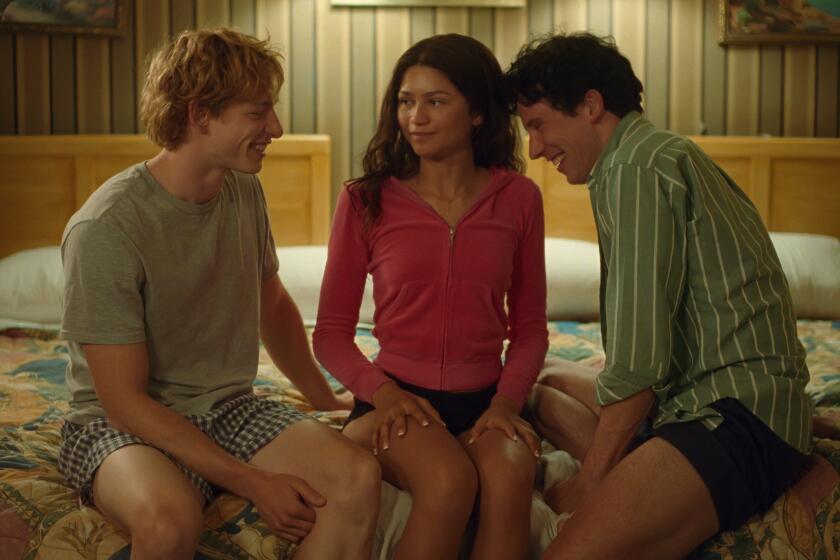Review: In ‘The Conduct of Life,’ witness an American classic that’s more often taught than staged
Hero Theatre organized a festival last year in celebration of Cuban American playwright María Irene Fornés, a key figure in the off-off-Broadway theater movement who has had an influence on contemporary American drama that far exceeds her modest fame.
Attendees of the festival had the opportunity to vote on which play should receive a full production. “The Conduct of Life,” one of Fornés’ compact masterpieces, was selected. The play is now being presented at the Rosenthal Theater at Inner-City Arts in L.A. through June 25. For me, it was an irresistible chance to see a work that appears more often on theater syllabi than on season brochures.
The mercurial theater aesthetic of Fornés is tricky to figure out in performance. Her dramas are at once painterly and playful, poetic and political, didactic and open-minded, emotionally grounded and stylistically oblique. She reconciles Theatre of the Absurd loopiness with Brechtian alienation in plays that stand in solidarity with the oppressed and disenfranchised. Zaniness coexists with brutality.
Driving past the pitiful ad-hoc shelters of the homeless population on the blocks surrounding Inner-City Arts, I was reminded that the experience of Nena (Antonia Cruz-Kent), the young girl in “The Conduct of Life” who is held captive by Orlando (Nick Caballero) to satisfy his lust, is as relevant to our society as it is to the unspecified Latin American autocracy in which the play is set. Nena, who is tied up in a warehouse at the beginning of the drama, eventually shares with us her history of living on the streets with her senile grandfather, who one day wandered off, leaving her more vulnerable to the predations of men like Orlando.
In director José Luis Valenzuela’s stage plan, the warehouse is situated on a raised platform at the back of François-Pierre Couture’s set. The domestic scenes are arranged downstage, as specified in Fornés’ elaborate stage directions, which have had to be modified. The various areas of the home Orlando shares with his wife, Leticia (Adriana Sevahn Nichols), and their servant, Olimpia (Elisa Bocanegra), aren’t always precisely differentiated, but the way in which Orlando tries to separate his violent outside life with his bourgeois comforts is perfectly clear.
When we first meet Orlando, he is a 33-year-old lieutenant who is determined to rise in the military dictatorship. We know he means business by the intensity of his jumping jacks and self-exhortations. Even his trusted colleague Alejo (Jonathan Medina) seems wary of his ferocious ambition.
Dialogue in “The Conduct of Life” is subordinate to the monologues the characters deliver about their lives. These speeches are composed in a stage language that is more of a distillation of values, dreams, thoughts and fears than a realistic rendition of how such characters might actually talk.
The actors are challenged to provide a convincing outline of their characters while being flexible enough to go along with the demands of a playwright who found most forms of naturalism unnatural. I have yet to see a production of “The Conduct of Life” that figures this out. (I missed the author’s own staging of the play’s 1985 premiere.) Valenzuela has intermittent success, but the value of the staging is in the research notes it provides to future adventurers in the Fornés canon.
Bocanegra, Hero’s producing artistic director and a disciple of Fornés who has helped raise money to support the playwright during her long battle with Alzheimer’s, makes a lasting impression as Olimpia, the willful housekeeper with a speech impediment who understands the power Leticia has over her terrifying husband better than Leticia herself. In her performance, plebeian fury and defiant sisterhood join forces against a brutalizing patriarchy that believes rape and torture are simply part of a day’s work.
Fornés’ drama lays bare the suffering of the poor, the hypocrisy of the rich and the everyday violence men inflict on women. But it’s the irrepressible resilience of her characters, the spontaneous patty-cake between Olimpia and Nena after Orlando brings the girl home, that has made Fornés such a seminal figure in contemporary playwriting. No matter how her characters are coerced and confined, their frolicsome resistance lights a path beyond ideology to freedom.
♦ ♦ ♦ ♦ ♦ ♦ ♦ ♦ ♦ ♦
‘The Conduct of Life’
Where: Rosenthal Theater at Inner-City Arts, 720 Kohler St., L.A.
When: 8 p.m. Thursdays-Saturdays, 7 p.m. Sundays; ends June 25
Tickets: $25
Info: www.herotheatre.org
Running time: 1 hour
SIGN UP for the free Essential Arts & Culture newsletter »
Follow me @charlesmcnulty
MORE RECENT READS AND REVIEWS:
Pakistani rape survivor Mukhtar Mai comes to L.A. to see justice, if only onstage
With ‘Thumbprint,’ witness an opera’s power to empower women
The astrophysicist’s rom-com: ‘Constellations’ at the Geffen
How ‘Home’ at LACMA rethinks ideas about Latin American art
More to Read
The biggest entertainment stories
Get our big stories about Hollywood, film, television, music, arts, culture and more right in your inbox as soon as they publish.
You may occasionally receive promotional content from the Los Angeles Times.











